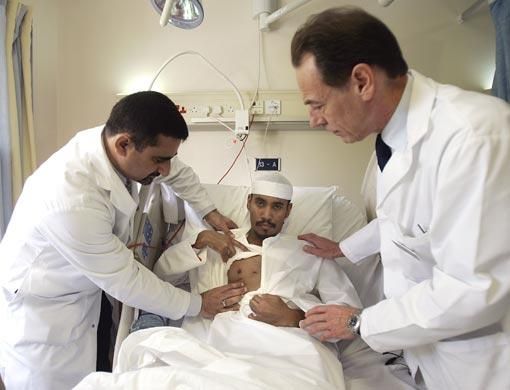Abu Dhabi: A 33-year-old man recently received successful minimally invasive cardiac surgery in a procedure that is still new to the UAE.
Most cardiac surgery involves a sternotomy, which involves splitting the entire breastbone.
Minimally invasive cardiac surgery encompasses a variety of operations performed through incisions that are substantially smaller and less traumatic than the standard sternotomy.
These incisions measure about 6 to 8 centimeters, compared to 18 to 25cm for a sternotomy.
Awad Mohammad, an Emirati, showed Gulf News his scar after the surgery. It was hardly evident.
Hesitant
"I was hesitant to undergo this surgery because I did not know that it involved an incision this small. I thought they would split open my entire breastbone area and that made me feel uncomfortable.
"But when I learnt the surgery was less complicated, I felt more confident about the procedure," said Mohammad.
The surgery was performed through a small thoracotomy (chest incision) instead of the traditional procedure that requires the surgeon to spread the breastbone apart to gain direct access to the heart.
Dr. Norbert Augustin, chairman of the department of cardiac sciences at Shaikh Khalifa Medical Centre (SKMC), performed the minimally invasive mitral valve repair.
Two other surgeons and assistants from SKMC, managed by Cleveland Clinic in the US, took part in the three hour surgery.
"Heart valve repair is always better than valve replacement, because patients do not need to take any medication to thin the blood. Furthermore it preserves the natural geometry of the heart and therefore improves the heart function," said Augustin.
The patient was also suffering from Sickle Cell Disease, which is an inherited disorder in which the body produces abnormally shaped red blood cells which leads to anaemia. The sickle cells block blood flow.
According to Mohammad, he was suffering from constant throat infections as a child and feels that may be the cause of his heart valve problem.
"A day after the surgery the patient was transferred to a normal ward and discharged after six days. After the wounds have healed, he will be able to follow a normal lifestyle," said the doctor.
Benefits
Less pain, trauma
Benefits of minimally invasive heart surgery in comparison to a traditional sternotomy where the breastbone needs to be split open, include:
- A smaller incision
- A smaller scar
Other possible benefits of minimally invasive heart surgery may include:
- Reduced risk of infection
- Less bleeding
- Less pain and trauma than with traditional surgery
---Decreased length of stay in hospital after the procedure: The average stay is four to six days after minimally invasive surgery, while the average stay after traditional heart surgery is from six to ten days.
--Decreased recovery time: The average recovery time after minimally invasive heart surgery is two to four weeks, while the average recovery time after traditional heart surgery is six to eight weeks.
Source:http://www.cleveland-clinic.org













